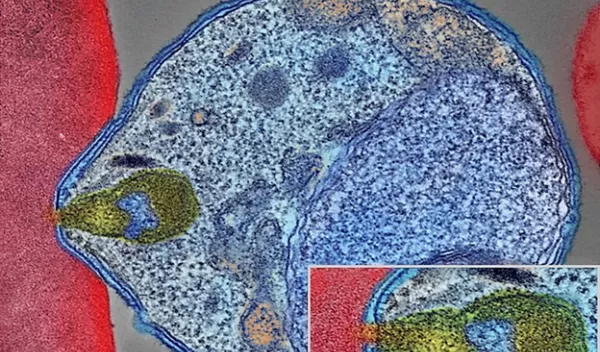
Biological clocks of people and malaria parasites tick in tune
Health officials warn that drug resistance could wipe out recent progress against malaria, particularly in Africa and southeast Asia. Now, researchers looking for other ways to fight the mosquito-borne parasites that cause the disease have zeroed in on a potential new target: biological clocks.
Most living things have internal clocks that govern fluctuations in everything from hunger and hormone levels to when genes are active throughout the day.
In a study published in the journal Proceedings of the National Academy of Sciences, U.S. National Science Foundation-supported researchers analyzed gene activity in patients who showed up at medical facilities along the Thailand-Cambodia border, showing signs of a malaria infection in their blood.
The team found that malaria parasites somehow sync their molecular rhythms with the internal 24-hour clocks of their hosts, their respective genes rising and falling in perfect lockstep with each other over the course of a day, like two pendulum clocks with synchronized swings.
The team of researchers at Duke University, Florida Atlantic University and the Armed Forces Research Institute of Medical Sciences say the findings could pave the way to new anti-malarial drugs that throw malaria's internal clock out of step with its host, essentially "jet-lagging" the parasites.
"We have a reason to care about this," said senior author Steve Haase at Duke. "We're on our last line of drugs, artemisinin-based combination therapies, and we're already seeing resistance to those in southeast Asia. Exploring some new ideas for fighting malaria makes sense."
When someone has malaria, a deadly loop repeats itself inside their body. The disease’s recurring fever spikes are caused by microscopic Plasmodium parasites that invade the person's red blood cells, multiply and then burst out in unison, spewing into the bloodstream by the millions to invade other cells and begin the cycle anew.
This cycle repeats itself every 24, 48 or 72 hours depending on the Plasmodium species. Which got scientists wondering: Could the parasites be coordinating in some way with the 24-hour circadian rhythms of their hosts?
The researchers identified hundreds of genes that follow a clock-like rhythm, ramping up at certain times of day and switching off at others. Using this data, they developed a way to calculate the internal clock time for each patient and for their parasites. Then they calculated how well the rhythms of gene expression were aligned.
Sure enough, for every turn of the parasite clock, the 24-hour body clock of their host went around twice.
As a next step, the researchers are trying to figure out exactly how the parasite and human clocks "communicate" with each other so that their cycles line up.
"There have to be some molecular signals that they're passing back and forth to each other," Haase said. "We don't know what they are, but if we can disrupt them, then we might have a shot at an intervention.


